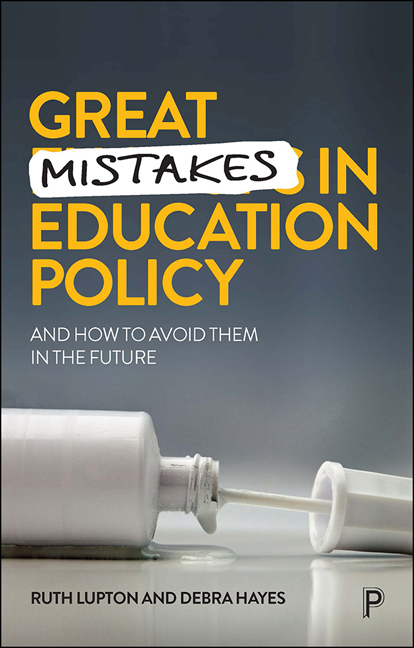Book contents
- Frontmatter
- Contents
- List of tables and boxes
- List of abbreviations
- Notes on the authors
- Acknowledgements
- 1 Introduction
- 2 Setting the scene
- 3 Tests, tests, tests
- 4 Schooling that works for some but not for others
- 5 Teachers making less of a difference
- 6 Mistake #1: turning to the market
- 7 Mistake #2: letting test scores drive policy
- 8 Mistake #3: over-prescribing teachers’ work
- 9 Mistake #4: misunderstanding educational inequalities
- 10 Mistake #5: leaving education out of education policy making
- 11 Synthetic phonics: a ‘perfect storm’ of policy mistakes
- 12 There are alternatives
- References
- Index
10 - Mistake #5: leaving education out of education policy making
Published online by Cambridge University Press: 23 December 2021
- Frontmatter
- Contents
- List of tables and boxes
- List of abbreviations
- Notes on the authors
- Acknowledgements
- 1 Introduction
- 2 Setting the scene
- 3 Tests, tests, tests
- 4 Schooling that works for some but not for others
- 5 Teachers making less of a difference
- 6 Mistake #1: turning to the market
- 7 Mistake #2: letting test scores drive policy
- 8 Mistake #3: over-prescribing teachers’ work
- 9 Mistake #4: misunderstanding educational inequalities
- 10 Mistake #5: leaving education out of education policy making
- 11 Synthetic phonics: a ‘perfect storm’ of policy mistakes
- 12 There are alternatives
- References
- Index
Summary
Our fifth mistake relates to the nature of education policy making and the characteristics of policy processes.
Our central argument is that for a variety of reasons and in a variety of ways, educational policy making has become increasingly divorced from knowledge of educational theory and practice. This is not to say that the knowledge of teachers, school leaders, academics and researchers who study teaching, learning and other aspects of the educational day-to-day is the only kind of knowledge that should count in education policy. As with many of the issues we have discussed, the problem is not that everything that has happened is bad, but that the balance has tipped too far in one direction, making it more likely that the wrong decisions will be made and that established policies will continue to be followed even when the evidence is clear that they are mistaken.
In this chapter, we draw on research about policy, rather than about specific policies as we have done in earlier chapters. We describe some of the problems with education policy-making processes in England and Australia, how they have come about, and why we think they are getting in the way of making education better and fairer.
Long-standing problems in education policy making
In their book on social policy mistakes in England, King and Crewe (2014) identify 12 factors that lead to ‘policy blunders’. Five of these come under the category of ‘human errors’: cultural disconnect (policy makers not understanding that other people's lives are not like their own); group-think; prejudice and pragmatism; operational disconnect (policy makers not understanding how policies will play out on the ground); and panic, symbols and spin. The others are ‘system failures’: the independence of Whitehall departments; the rapid turnover of ministers and civil servants; the increasingly activist role of ministers; lack of ministerial accountability (particularly for the long-term consequences of their actions); the weak role of parliament in the English system; asymmetries of expertise especially with private sector partners; and a deficit of deliberation in the making of policy. System failures make human errors more likely and more damaging.
Education policy research points to education being particularly prone to some of these human errors, not least the commonly recognised problem of ministers relying on their own knowledge of schooling and their own prejudices.
- Type
- Chapter
- Information
- Great Mistakes in Education PolicyAnd How to Avoid Them in the Future, pp. 121 - 132Publisher: Bristol University PressPrint publication year: 2021

